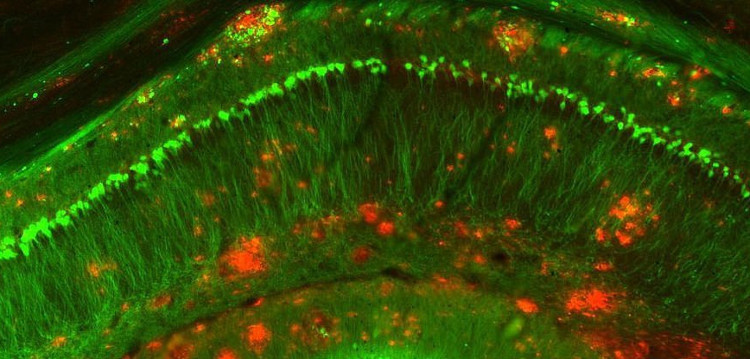Detecting protein can reverse Alzheimer's symptoms
This protein can help restore memory and cognitive function in mice. That opens new prospects for Alzheimer's treatment in humans.
British researchers have recently discovered that injecting a protein called IL-33 reverses Alzheimer's-like symptoms and cognitive impairment in mice, restoring memory and receiving function. wake up like healthy mice for about a week.
Specifically, mice fed to develop Alzheimer's-like disease in adulthood (called APP / PS1 mice) will receive a daily dose of protein, and it will not only help eliminate amyloids. toxic (starch) is thought to cause Alzheimer's disease in humans but also prevents them from forming again.

New proteins can reverse Alzheimer's symptoms in mice.This opens new prospects for Alzheimer's treatment in humans.
"IL-33 is a protein produced by different cell types in the body and especially abundant in the central nervous system (brain and spinal cord)," said lead researcher Eddy Liew. , comes from Glasgow University (UK).
- "We found that, when injected with IL-33, sick mice quickly improved memory and cognitive function with normal mice of the same age within a week."
Scientists say that these results are currently only from mouse experiments, and at this stage, no one can say anything.
Moving studies from mice to people with success rates is not great - a positive result from experiments with mice transferred to humans, the success will be only 8%, so we should not so happy until the new method can be tested on humans.
However, when it comes to a disease that does not yet have a cure for 65 million people by 2030, any study is valuable (for reference if not successful), and the The team found that some aspects of this study could be applied to Alzheimer's patients.
In humans, Alzheimer's disease usually results from an accumulation of two types of damage in the brain - the amyloid and neurofibrillary tangles.
Amyloid plaques lie between nerve cells and form dense clusters of a protein fold called beta-amyloid.
Neurofibrillary plexus is found inside nerve cells, because defective tau proteins clump into a thick layer, becoming an insoluble lump. When that happens, the microtubule (microtubule - the constituent of the cell skeleton) disintegrates, damaging the system of transporting essential nutrients around the brain.
Until now, no one knows why some people have amyloid plaques and neurofibrillary strands accumulating in the brain when they get old, while others do not.
But scientists believe that if we can find a way to eliminate them and prevent the formation of these types of lesions, Alzheimer's disease will be able to be thoroughly treated.
When tested with mice, Liew and his team discovered that IL-33 appears to promote the activity of immune cells in the brain called glia , directing them towards the amyloid array. toxic.

Professor Eddy Liew, who led the research project, came from Glasgow University (UK).
When plaque is on the target, strong glia targets and absorbs them with the help of an enzyme called neprinlysin , known to destroy the amyloid residue.
This process has reduced the size and number of amyloid plaques in mice with Alzheimer's-like symptoms.
Not only that, injections of IL-33 also prevent inflammation in brain tissue, but previous studies have shown that these infections are linked to the development of plaque and neurofibrillary plexus.
"Therefore, IL-33 not only eliminates the formed amyloid plaque, but also prevents deposition of plaque and plexus formation," the team from Glasgow University said. .
This is really a good news and an interesting result for researchers around the world who have worked hard to find a cure for Alzheimer's disease in humans.
Optimistic Liew: "The relevance of this result to Alzheimer's disease in humans is currently unclear, but it is an encouraging sign. For example, previous genetic studies have shown an association between "IL-33 mutations and Alzheimer's disease in European and Chinese populations. Furthermore, the brains of Alzheimer's patients contain less IL-33 than the brains of healthy people."
He added: "There have been enough" breakthrough "mistakes in the medical field to warn us not to be distracted until rigorous clinical trials are done."
This study is published in the Proceedings of the Russian Academy of Sciences.
- Detecting protein causes baldness in men
- Detecting protein helps prevent dengue
- Detecting protein helps treat obesity
- Found a way to reverse dwarf syndrome
- What is the role of protein to health?
- Detecting new proteins that block HIV virus
- Protein has the ability to burn body fat
- Detecting protein causes depression
- Detecting protein causing eczema
- Detecting a protein that kills cancer cells
- High-protein diets help people reduce their risk of stroke
- Special 'reverse' filter: Only large objects are allowed to pass
 Green tea cleans teeth better than mouthwash?
Green tea cleans teeth better than mouthwash? Death kiss: This is why you should not let anyone kiss your baby's lips
Death kiss: This is why you should not let anyone kiss your baby's lips What is salmonellosis?
What is salmonellosis? Caution should be exercised when using aloe vera through eating and drinking
Caution should be exercised when using aloe vera through eating and drinking